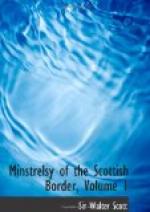Sae now he’s o’er the floods sae gray.—P. 269. v. 3.
This seems to have been a favourite epithet in old romances, Thus in Hornchilde, and Maiden Rimuild,
Thai sayled ower the flode so gray,
In Inglond arrived were thay,
Ther him levest ware.
THE LADS OF WAMPHRAY.
The reader will find, prefixed to the foregoing ballad, an account of the noted feud betwixt the families of Maxwell and Johnstone. The following song celebrates the skirmish, in 1593, betwixt the Johnstones and Crichtons, which led to the revival of the ancient quarrel betwixt Johnstone and Maxwell, and finally to the battle of Dryffe Sands, in which the latter lost his life. Wamphray is the name of a parish in Annandale. Lethenhall was the abode of Johnstone of Wamphray, and continued to be so till of late years. William Johnstone of Wamphray, called the Galliard, was a noted freebooter. A place, near the head of Tiviotdale, retains the name of the Galliard’s Faulds, (folds) being a valley where he used to secrete and divide his spoil, with his Liddesdale and Eskdale associates. His nom de guerre seems to have been derived from the dance called The Galliard. The word is still used in Scotland, to express an active, gay, dissipated character.[199] Willie of the Kirkhill, nephew to the Galliard, and his avenger, was also a noted border robber. Previous to the battle of Dryffe Sands, so often mentioned, tradition reports, that Maxwell had offered a ten-pound-land to any of his party, who should bring him the head or hand of the laird of Johnstone. This being reported to his antagonist, he answered, he had not a ten-pound-land to offer, but would give a five-merk-land to the man who should that day cut off the head or hand of Lord Maxwell. Willie of the Kirkhill, mounted upon a young gray horse, rushed upon the enemy, and earned the reward, by striking down their unfortunate chieftain, and cutting off his right hand.
Leverhay, Stefenbiggin, Girth-head, &c. are all situated in the parish of Wamphray. The Biddes-burn, where the skirmish took place betwixt the Johnstones and their pursuers, is a rivulet which takes its course among the mountains on the confines of Nithesdale and Annandale. The Wellpath is a pass by which the Johnstones were retreating to their fastnesses in Annandale. Ricklaw-holm is a place upon the Evan water, which falls into the Annan, below Moffat. Wamphray-gate was in these days an ale-house. With these local explanations, it is hoped the following ballad will be easily understood.
From a pedigree in the appeal case of Sir James Johnstone of Westeraw, claiming the honours and titles of Annandale, it appears that the Johnstones of Wamphray were descended from James, sixth son of the sixth baron of Johnstone. The male line became extinct in 1657.
[Footnote 199: Cleveland applies the phrase in a very different manner, in treating of the assembly of Divines at Westminster, 1644:




